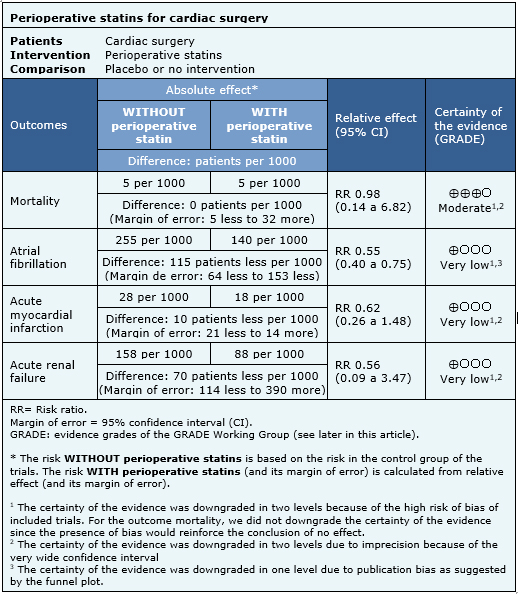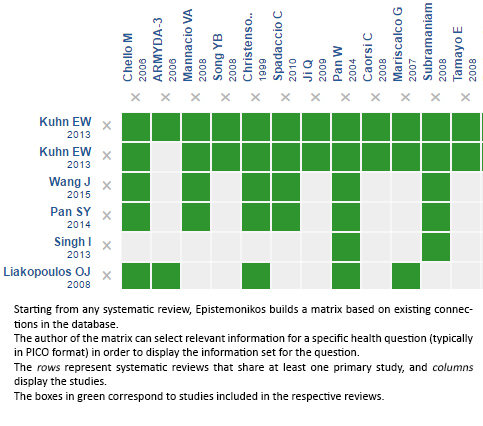Epistemonikos summaries
← vista completaPublished on January 16, 2017 | http://doi.org/10.5867/medwave.2017.6834
Are perioperative statins beneficial for cardiac surgery?
¿Son beneficiosas las estatinas en el periodo perioperatorio de una cirugía cardiaca?
Abstract
The use of perioperative statins has been proposed as a measure to reduce morbidity and mortality in cardiac surgery. However, their clinical role is controversial. Searching in Epistemonikos database, which is maintained by screening multiple databases, we identified 36 systematic reviews comprising 92 primary studies addressing the question of this article, including 22 randomized trials. We extracted data, combined the evidence using meta-analysis and generated a summary of findings following the GRADE approach. We concluded perioperative statins probably do not decrease mortality in cardiac surgery and it is unclear if they have any benefit because the certainty of the evidence is very low.
Problem
Cardiac surgery leads to high morbidity and mortality due to multiple causes such as atrial fibrillation, myocardial infarction, acute renal failure and stroke. On the other hand, statins are a family of drugs that have shown a reduction in cardiovascular events, mainly due to their clinical effects on lipid profile. However, pleiotropic effects have been proposed, including an acute anti-inflammatory mechanism, whose real clinical impact is a matter of debate.
In this context, it has been suggested that the use of perioperative statins may reduce morbidity and mortality in cardiac surgery.
Methods
We used Epistemonikos database, which is maintained by screening multiple databases, to identify systematic reviews and their included primary studies. With this information, we generated a structured summary using a pre-established format, which includes key messages, a summary of the body of evidence (presented as an evidence matrix in Epistemonikos), meta-analysis of the total of studies, a summary of findings table following the GRADE approach and a table of other considerations for decision-making.
|
Key messages
|
About the body of evidence for this question
|
What is the evidence. |
We found 36 systematic reviews reported in 38 references [1],[2],[3],[4],[5],[6],[7],[8],[9],[10],[11],[12],[13], |
|
What types of patients were included |
The characteristics of the included patients were: Regarding type of surgery, 17 trials [45],[50],[51],[56], [57],[58],[59],[60],[78],[93],[97],[116],[117],[120], [121],[124],[134] included only coronary reperfusion surgery; four any type of cardiac surgery [70],[84],[107],[111]; and one any type of cardiac surgery except coronary surgeries [42]. Seven studies excluded emergency surgery [42],[59],[107], [111],[117],[121],[124] and one study [60] included 87% elective surgeries. From the remaining trials it was not possible to obtain data from the systematic reviews on this variable. |
|
What types of interventions were included |
Regarding type of statin, three trials [42],[60],[124] used simvastatin, 15 trials used atorvastatin [45],[50],[58], [59],[70],[78],[84],[97],[107],[111],[116],[117],[120], [121],[134], two trials used rosuvastatin [57],[93], one trial used fluvastatin [51] and one trial used pravastatin/pitavastatin [56]. The doses ranged from 20 to 80 mg per day depending on the type of statin. All trials compared with placebo or standard treatment, except two trials [84],[116] that compared against a lower dose of statins. |
|
What types of outcomes |
Systematic reviews grouped the outcomes as follows:
|
Summary of findings
The information about the effects of perioperative statins on cardiac surgery is based on 22 randomized trials involving 4,335 patients. Eight trials reported mortality (735 patients) [50],[59],[60],[78],[107],[116],[117],[124]; 12 trials reported atrial fibrillation (3,020 patients) [50],[56],[57],[59],[78],[93],[107],[116],[117],[120],[124],[134]; 11 trials reported acute myocardial infarction (1,064 patients) [50],[51],[59],[60],[70],[78],[93], [107],[116],[120],[134] and two reported acute renal failure (117 patients) [57],[60].
The summary of findings is as follows:
- Perioperative statins probably do not decrease mortality in cardiac surgery. The certainty of the evidence is moderate.
- It is unclear whether perioperative statins decrease the risk of atrial fibrillation in cardiac surgery, because the certainty of the evidence is very low.
- It is unclear whether perioperative statins decrease the risk of acute myocardial infarction in cardiac surgery, because the certainty of the evidence is very low.
- It is unclear whether perioperative statins decrease the risk of acute renal failure in cardiac surgery, because the certainty of the evidence is very low.


Other considerations for decision-making
|
To whom this evidence does and does not apply |
|
| About the outcomes included in this summary |
|
| Balance between benefits and risks, and certainty of the evidence |
|
| What would patients and their doctors think about this intervention |
|
| Resource considerations |
|
|
Differences between this summary and other sources |
|
| Could this evidence change in the future? |
|
How we conducted this summary
Using automated and collaborative means, we compiled all the relevant evidence for the question of interest and we present it as a matrix of evidence.

Follow the link to access the interactive version: Perioperative statins for cardiac surgery
Notes
The upper portion of the matrix of evidence will display a warning of “new evidence” if new systematic reviews are published after the publication of this summary. Even though the project considers the periodical update of these summaries, users are invited to comment in Medwave or to contact the authors through email if they find new evidence and the summary should be updated earlier. After creating an account in Epistemonikos, users will be able to save the matrixes and to receive automated notifications any time new evidence potentially relevant for the question appears.
The details about the methods used to produce these summaries are described here http://dx.doi.org/10.5867/medwave.2014.06.5997.
Epistemonikos foundation is a non-for-profit organization aiming to bring information closer to health decision-makers with technology. Its main development is Epistemonikos database (www.epistemonikos.org).
These summaries follow a rigorous process of internal peer review.
Conflicts of interest
The authors do not have relevant interests to declare.

